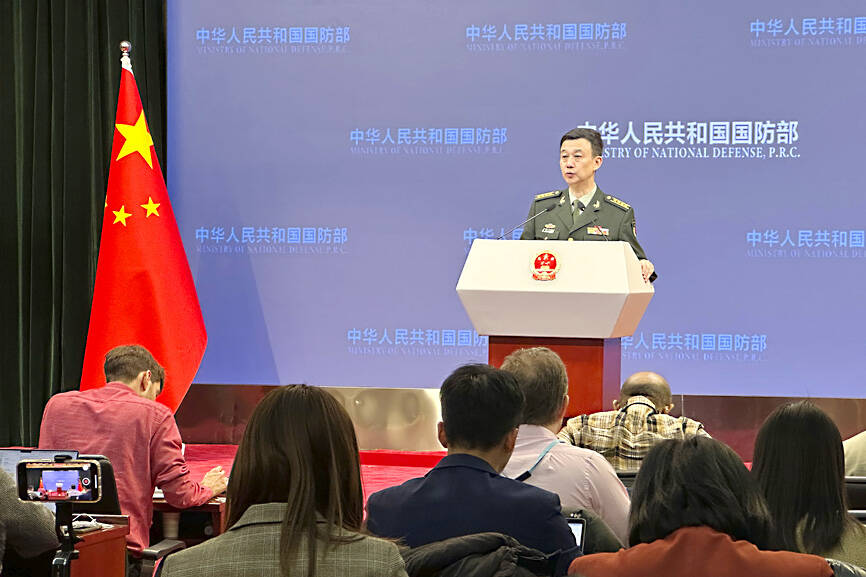China’s Ministry of National Defense on Thursday accused Taiwan’s government of deliberately “hyping up” a military threat from China for electoral gain ahead of elections in just over two weeks, but again sent warplanes into the Taiwan Strait.
As the Jan. 13 elections draw near, Taiwan has reported Chinese fighter jets and warships around the nation, as well as balloons crossing the median line of the Taiwan Strait, although the military says they are most likely for weather monitoring purposes.
Speaking at a monthly news conference in Beijing, ministry spokesperson Colonel Wu Qian (吳謙) said that Taiwan’s government was to blame for the tensions.

Photo: Emily Wang Fujiyama, AP
“The Democratic Progressive Party (DPP) authorities are deliberately hyping up the so-called ‘military threat from the mainland’ and exaggerating tensions,” Wu said.
“This is entirely to seek electoral gain,” he added, accusing Taiwan of using a “familiar electoral playbook to stoke confrontation and manipulate the election.”
Shortly after Wu spoke, the Ministry of National Defense (MND) in Taipei reported further Chinese military activities in the Strait, saying it had detected 12 military aircraft crossing the median line or flying close to it on Thursday afternoon.
It said the aircraft, including J-11 and Su-30 jets, entered airspace to the north, center and southwest of Taiwan, and “cooperated with communist ships to carry out joint combat readiness patrols.”
Wu reiterated that China did not recognize the median line.
“Taiwan is a part of China. The ‘median line’ absolutely does not exist,” he said.
The MND this week said it was not seeing any signs of large-scale Chinese military activity before the elections, but was keeping a close watch on China.
Wu said China’s People’s Liberation Army was well aware of Taiwan’s military movements.
“We will, as always, take all necessary measures to resolutely defend national sovereignty and territorial integrity,” he added.
From the start of this month, Taiwan has reported a spate of Chinese balloons drifting over the Taiwan Strait, saying they were probably monitoring weather conditions.
Wu declined to comment on the balloons.
China has also been angered by US arms sales to Taiwan.
“We firmly oppose any country having official and military contact with Taiwan in any form,” Wu added. “The US is manipulating the Taiwan question in various forms, which is a very dangerous gamble.”

A preclearance service to facilitate entry for people traveling to select airports in Japan would be available from Thursday next week to Feb. 25 at Taiwan Taoyuan International Airport, Taoyuan International Airport Corp (TIAC) said on Tuesday. The service was first made available to Taiwanese travelers throughout the winter vacation of 2024 and during the Lunar New Year holiday. In addition to flights to the Japanese cities of Hakodate, Asahikawa, Akita, Sendai, Niigata, Okayama, Takamatsu, Kumamoto and Kagoshima, the service would be available to travelers to Kobe and Oita. The service can be accessed by passengers of 15 flight routes operated by

Chinese spouse and influencer Guan Guan’s (關關) residency permit has been revoked for repeatedly posting pro-China videos that threaten national security, the National Immigration Agency confirmed today. Guan Guan has said many controversial statements in her videos posted to Douyin (抖音), including “the red flag will soon be painted all over Taiwan” and “Taiwan is an inseparable part of China,” and expressing hope for expedited reunification. The agency last year received multiple reports alleging that Guan Guan had advocated for armed reunification. After verifying the reports, the agency last month issued a notice requiring her to appear and explain her actions. Guan

GIVE AND TAKE: Blood demand continues to rise each year, while fewer young donors are available due to the nation’s falling birthrate, a doctor said Blood donors can redeem points earned from donations to obtain limited edition Formosan black bear travel mugs, the Kaohsiung Blood Center said yesterday, as it announced a goal of stocking 20,000 units of blood prior to the Lunar New Year. The last month of the lunar year is National Blood Donation Month, when local centers seek to stockpile blood for use during the Lunar New Year holiday. The blood demand in southern Taiwan — including Tainan and Kaohsiung, as well as Chiayi, Pingtung, Penghu and Taitung counties — is about 2,000 units per day, the center said. The donation campaign aims to boost

The Central Weather Administration (CWA) said a magnitude 4.9 earthquake that struck off the coast of eastern Taiwan yesterday was an independent event and part of a stress-adjustment process. The earthquake occurred at 4:47pm, with its epicenter at sea about 45.4km south of Yilan County Hall at a depth of 5.9km, the CWA said. The quake's intensity, which gauges the actual effects of a temblor, was highest in several townships in Yilan and neighboring Hualien County, where it measured 4 on Taiwan's seven-tier intensity scale, the CWA said. Lin Po-yu (林柏佑), a division chief at the CWA's Seismological Center, told a news conference